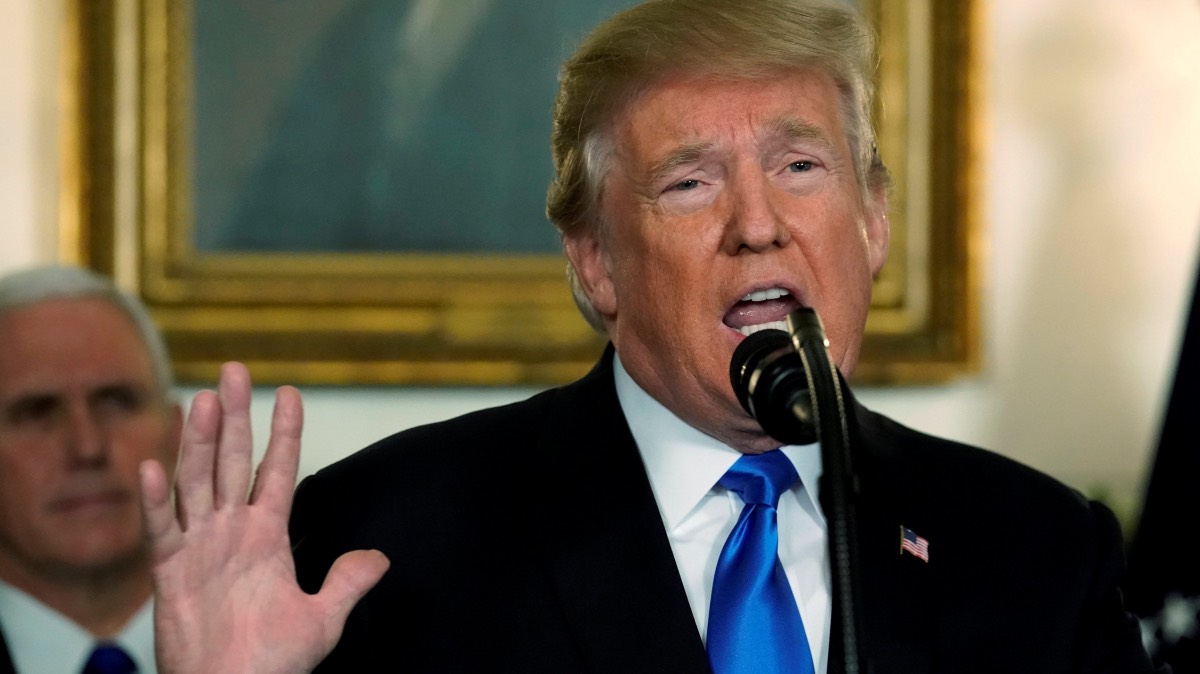President Trump declared on Tuesday, May 8, 2018, that he was withdrawing from the Iran nuclear deal, unraveling the signature foreign policy achievement of his predecessor Barack Obama, isolating the United States from its Western allies and sowing uncertainty before a risky nuclear negotiation with North Korea.
The decision, while long anticipated and widely telegraphed, leaves the 2015 agreement reached by seven countries after more than two years of grueling negotiations in tatters. The United States will now reimpose the stringent sanctions it imposed on Iran before the deal and is considering new penalties.
Iran said it will remain in the deal, which tightly restricted its nuclear ambitions for a decade or more in return for ending the sanctions that had crippled its economy.
So did France, Germany, and Britain, raising the prospect of a trans-Atlantic clash as European companies face the return of American sanctions for doing business with Iran. China and Russia, also signatories to the deal, are likely to join Iran in accusing the United States of violating the accord.
Trump’s move could embolden hard-line forces in Iran, raising the threat of Iranian retaliation against Israel or the United States, fueling an arms race in the Middle East and fanning sectarian conflicts from Syria to Yemen.
The president, however, framed his decision as the fulfillment of a bedrock campaign promise and as the act of a dealmaker dissolving a fatally flawed agreement. He predicted his tough line with Iran would strengthen his hand as he prepared to meet North Korea’s leader, Kim Jong-un, to begin negotiating the surrender of his nuclear arsenal.“This was a horrible one-sided deal that should have never, ever been made,” a grim-faced Mr. Trump said in an 11-minute address from the Diplomatic Reception Room of the White House. “It didn’t bring calm, it didn’t bring peace, and it never will.”
Trump’s announcement drew a chorus of opposition from European leaders, several of whom lobbied him feverishly not to pull out of the agreement and searched for fixes to it that would satisfy him.
It also drew a rare public rebuke by Mr. Obama, who said Mr. Trump’s withdrawal would leave the world less safe, confronting it with “a losing choice between a nuclear-armed Iran or another war in the Middle East.”The response from Iran itself, however, was muted. President Hassan Rouhani declared that the Iranians intended to abide by the terms of the deal, and he criticized Mr. Trump for his history of not honoring international treaties. Mr. Trump won strong backing from Saudi Arabia and Israel, whose leader, Prime Minister Benjamin Netanyahu, hailed him for a “historic move” and “courageous leadership.”
Three times previously, the president’s aides had persuaded him not to dismantle the Iran deal. But Mr. Trump made clear that his patience had worn thin, and with a new, more hawkish cohort of advisers — led by Secretary of State Mike Pompeo and the national security adviser, John R. Bolton — the president faced less internal resistance than earlier in his administration.
While Mr. Trump had long scorned the Iran deal, threatening repeatedly to rip it up during the 2016 presidential race, his impulse to act now was reinforced by what he views as the success of his policy toward North Korea. He has told aides and foreign leaders that his policy of maximum pressure had forced Mr. Kim to the bargaining table, and that a similar policy of overwhelming pressure would enable the United States to extract a better deal from Iran.
As Mr. Trump abandoned one diplomatic project, he accelerated another — announcing that Mr. Pompeo was flying to Pyongyang, the capital of North Korea, to continue discussions with Mr. Kim about the upcoming summit meeting. He expressed hope that three Americans who are detained in the North would be released soon.
“The message to North Korea,” Mr. Bolton told reporters, “is the president wants a real deal.”
He rejected the suggestion that the United States could not be trusted to keep its agreements when political winds change. “Any nation reserves the right to correct a past mistake,” Mr. Bolton said, citing President George W. Bush’s decision to withdraw from the Antiballistic Missile Treaty in 2001.
The Trump administration, he said, would continue to work with Europeans to pressure the Iranians. He dismissed those who said the United States was on a path to war with Iran, though he did not present any new diplomatic initiatives. Another senior administration official acknowledged that there was no Plan B.
Read more at Nytimes







